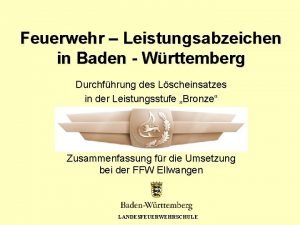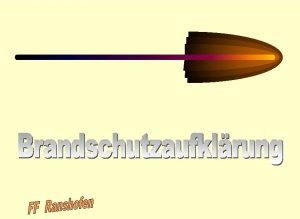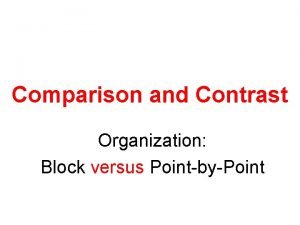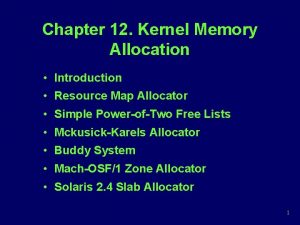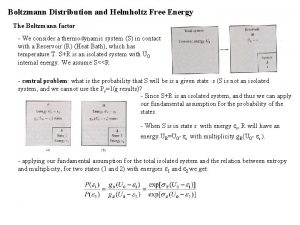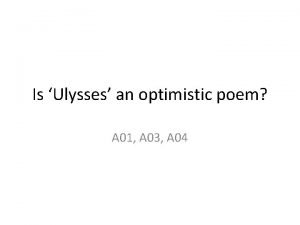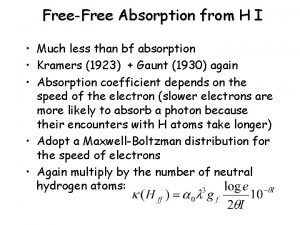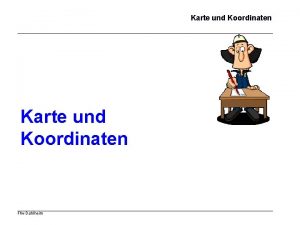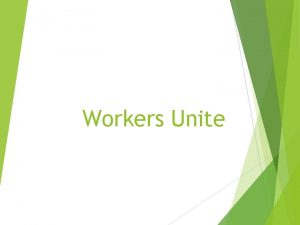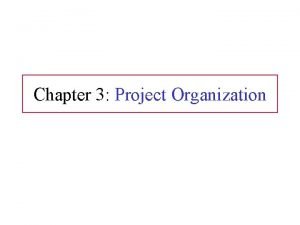Organization FEDERATION OF FREE WORKERS FFW SUMMARY PROJECT












- Slides: 12

�Organization: FEDERATION OF FREE WORKERS (FFW) SUMMARY PROJECT OUTLINE (SPROUT) Project Title: Using IT in Improving the Legal Services of the Paralegal Network of FFW Tentative Duration: Continuing Starting Date: April 1, 2009 Geographical Coverage: Nationwide Project Language: English Executing Organization/Unit: FFW Legal Center-Office of the President Preparation Date: March 19, 2009 Author: Atty. Allan S. Montaño

Background & Justification Ø Founded on June 19, 1950, the Federation of Free Workers, commonly known as “FFW”, is one of the 138 legitimate labor federations existing in the Republic of the Philippines. Ø Philippines has a total workforce of 37 million, with an unemployment rate of 12%. Of the total workforce, 18 million are salaried workers, while the rest are in the informal sector, either self-employed, under-employed, or unemployed at all.

Background & Justification Ø Organizing workers in the Philippines for purposes of collective bargaining, however, is not easy at all. While its laws including its fundamental law – the Constitution, guarantee the rights of the workers to self-organization, collective bargaining, and even to concerted action, in practice however, the same remains a dream for most Filipino workers. Other than the inherent resistance of the capitalist-employers to unionism – as it would mean diminution of their wealth as they be forced to share the same through collective bargaining, as well as would result to decreased power as their management prerogatives would be curtailed by the CBA, in addition, however, there are restrictive laws to contend, not to mention the difficulty in its enforcement, primarily because of the weak enforcement policies of the government compounded by the lack of labor inspectors.

Background & Justification Ø Government records have shown that there are more than 800, 000 establishments duly registered in the Philippines. However, ninety percent (90%) of the said establishments employ less than ten (10) workers which accounts to more than ninety percent (90%) of the total employments. Ø At present, FFW has 158, 000 members. However, of its total membership, only about twenty percent (20%), or about 28, 000 of whom are from the formal sector and covered by Collective Bargaining Agreements (CBAs), but whose security of tenure are threatened by work flexibilization being employed by employers in order to survive as demanded by globalization. The rest, are in the informal sector who are heavily subsidized by the regularly dues paying members from the formal sector.

Background & Justification Ø While FFW maintains a Legal Center in its headquarters in the National Capital Region with five (5) lawyers and paralegals; and retained counsel each in Davao City, Cagayan de Oro City, Cebu City and Iloilo City, the same, however, is not sufficient to meet the ever increasing demand for quality legal services of its members. Thus, there is a need for FFW to improve and maximize legal actions to protect its interests and of its members, thereby necessarily needing to improve the quality of services of its current lawyers and paralegals, and to increase their numbers and networking, to effectively address the above-mentioned need for legal services. Ø The legal services of lawyers in the Philippines, however, are very expensive, and at the same time, workers are not assured of their loyalty to workers’ cause. Thus, there is a need to empower ordinary trade union leaders and members, who possess the basic skills and knowledge and have shown as potentials to be trained and empowered as “paralegals” – non-lawyers but who are trained to do the works of the lawyers.

Background & Justification Ø Further to their basic skills and legal knowledge, they have to be equipped with technical knowledge to explore and exploit the use of information technology to facilitate and hasten their works as paralegals, such as IT applications in the preparation of pleadings, affidavit, and other necessary documents, not to mention the most important role of research in legal works. Ø Likewise, due to geographical situation of the Philippines which is consisted of more than 7, 000 islands, thus frequent meetings very expensive, there is an extreme need for the said paralegals to form a network, to help one another in analyzing, laying down the facts of the case, forming theory of the case, discussing and sharing information on laws and jurisprudence that are applicable in the case. Thus, no doubt, their work can be made easy through the facility afforded by recent information technology. Ø Hence, this Proposal of Using Information Technology in Improving the Legal services of the Paralegals of FFW.

TARGET GROUP & PARTIES INVOLVED The parties involved in the implementation of this proposal are: q Office of the President of FFW: q To insure that necessary budget is allocated, and that activities carried out as planned. q Current lawyers in the FFW Legal Center : q To guide and train would be paralegals to insure that legal strategy to be employed is in accordance with FFW’s approach and tactic. q Information technology expert: q To train all that are involved in rendering legal services to the use of IT to improve the services they are extending to FFW’s members. q Current volunteer paralegals: q Whose current skills would be updated, particularly on the use of IT to facilitate and enhance their works as paralegals. q Ordinary trade union leaders and members, who possess the basic skills and knowledge. q To be trained and empowered as paralegals.

OBJECTIVES: Ø Immediate: Ø To organize a network of paralegals, nationwide, through an e- group within the month of April 2009. Ø Mediate: Ø Each member of the network of paralegals must have basic knowledge of computers and can use computers for correspondence, information sharing, preparation of pleadings and do research for laws and jurisprudence applicable in the cases they are confronted with, within three (3) months from April 2009. Ø Long term: To maintain a continuing sustainable network of lawyers and paralegals to address the ever increasing legal services demanded by FFW and its members.

ACTIVITIES: q Activity No. 1. q The Office of the President of FFW to direct the Head of its Legal Center to contact, by any possible means, all current lawyers, including retained counsels, paralegals and potential paralegals to each open, at the very least, their respective email addresses. q Activity No. 2. q The Office of the President, through its Legal Center and an IT Expert, to conduct a three (3) days IT Training for all its current lawyers, including retained counsels, paralegals and identified potential paralegals, not exceeding twenty (20) have to have basic knowledge of computers and its use for correspondence, information sharing, preparation of pleadings and do research for laws and jurisprudence applicable in the cases they are confronted with. q Activity No. 3. q Continues networking, sharing information, giving assistance to one another in analyzing the case, forming theory of the case, and sharing knowledge in the preparation of pleadings and other necessary documents.

MAIN INPUTS: q. The main input necessary to ensure success of the project are computers for each paralegals and access to internet. q. Financial resources

INDICATORS OF ACHIEVEMENT: Ø Existence of an e-network of paralegals in FFW. Ø Actual number of trade union members and leaders empowered as paralegals rendering legal services to FFW and its members. Ø Number of cases handled in different levels (grievance stage, arbitral stage, appeal stage).

Grazie! Thank You! Maraming salamat po! Muchas gracias!
